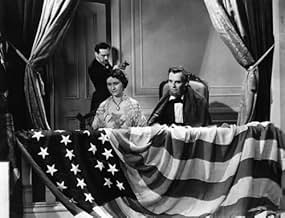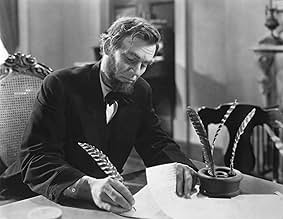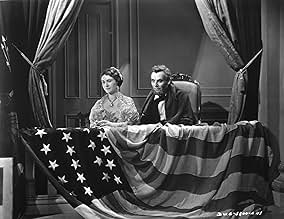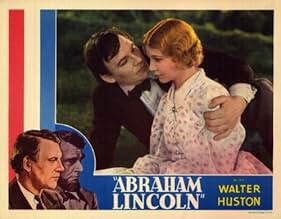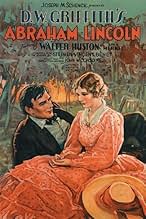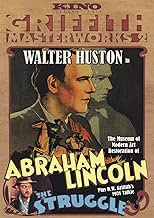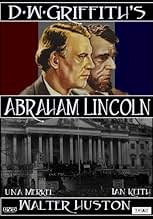VALUTAZIONE IMDb
5,7/10
1814
LA TUA VALUTAZIONE
Aggiungi una trama nella tua linguaAn episodic biography of the 16th President of the United States.An episodic biography of the 16th President of the United States.An episodic biography of the 16th President of the United States.
- Regia
- Sceneggiatura
- Star
- Premi
- 4 vittorie totali
William L. Thorne
- Tom Lincoln
- (as W.L. Thorne)
Edgar Dearing
- Armstrong
- (as Edgar Deering)
Jason Robards Sr.
- Herndon
- (as Jason Robards)
Cameron Prud'Homme
- John Hay - Secretary to the President
- (as Cameron Prudhomme)
James Eagles
- Young Soldier
- (as Jimmie Eagle)
Recensioni in evidenza
... "personally directed" by D. W. Griffith. Walter Huston stars as Lincoln, shown from his birth through his rough-and-tumble early years, his doomed romance with Ann Rutledge (Una Merkel), his marriage to the eccentric Mary Todd (Kay Hammond), and his election to the presidency, where he presided over the U. S. Civil War, during which he wrote the Emancipation Proclamation freeing the slaves, before being felled by an assassin's bullet.
Like most of Griffith's movies, this is a mixed bag of interesting choices, corny populism, and a rose-colored vision of the past. I was surprised by the opening of the film, set aboard a trans-Atlantic slave ship, featuring slave traders coldly discussing their remaining "inventory" as they toss a dead African overboard. As this was one of a few scenes missing its audio, I have a feeling it was often cut out during exhibition.
I was confused by Griffith's decision to cast E. Alyn Warren as both Stephen Douglas and Ulysses Grant: were there not enough qualified actors around? I liked seeing silent film stalwarts Hobart Bosworth and Henry B. Walthall as General Robert E. Lee and his attendant colonel, respectively. I liked Walter Huston as Honest Abe, and was surprised by how much he looked like the photographs of Lincoln in the last third of the film.
The biopic elements themselves are simplistic and hagiographic, and things seemed rushed, trying to tell his entire life story in 90 minutes. I was not a fan of Hammond as Mary Todd, and felt she dragged the proceedings down quite a bit.
Like most of Griffith's movies, this is a mixed bag of interesting choices, corny populism, and a rose-colored vision of the past. I was surprised by the opening of the film, set aboard a trans-Atlantic slave ship, featuring slave traders coldly discussing their remaining "inventory" as they toss a dead African overboard. As this was one of a few scenes missing its audio, I have a feeling it was often cut out during exhibition.
I was confused by Griffith's decision to cast E. Alyn Warren as both Stephen Douglas and Ulysses Grant: were there not enough qualified actors around? I liked seeing silent film stalwarts Hobart Bosworth and Henry B. Walthall as General Robert E. Lee and his attendant colonel, respectively. I liked Walter Huston as Honest Abe, and was surprised by how much he looked like the photographs of Lincoln in the last third of the film.
The biopic elements themselves are simplistic and hagiographic, and things seemed rushed, trying to tell his entire life story in 90 minutes. I was not a fan of Hammond as Mary Todd, and felt she dragged the proceedings down quite a bit.
I think it qualifies as a must-see film for all true scholars of the cinema. That is not to say that it is a good film. It is most certainly not. But this is really a perfect film in which to study the biggest change that this artistic medium ever experienced, the change from silence to sound. The whole film comes off as so, so awkward. It doesn't help that the script is awful. The film is actually over-ambitious, trying hard to cover the entire life of Abe, from birth to death. However bad Abraham Lincoln is, though, I myself found it more than watchable and always fascinating. 6/10.
This being a presidential election year made me curious about this early talkie. I had seen it before but it's been a while and so I wanted to actually go through a diagnosis of the movie itself. So I dragged out an old A&E VHS made copy. Griffith had tackled the Booth assassination of Lincoln before in the silent Birth of A Nation. Here he did it in sound and Ian Keith is great as John Wilkes Booth: "S-I-C T-E-M-P-E-R T-Y-R-A-N-N-I-S... As he yells after he shoots Lincoln at Ford's theatre and jumps onto the stage. And Walter Huston is much more Lincolnesque than Henry Fonda would be ten years later. Also the scene where Lincoln & U.S. Grant are conversating over cigars was kind of priceless. Una Merkel is compelling in an early film performance as Lincoln's first wife Ann Rutledge.
This was Griffith's first sound film and he shows a somewhat uneasiness with the new medium but what director didn't in 1930. Griffith faired better than most. If you can look past the oldness of the film you'll see that this is pretty much a straight forward & accurate & well made(by 1930 standards) telling of the events of Lincoln's life. The sort of way Masterpiece Theatre would later tell stories episodically over many hours decades later. Griffith shows an aptitude for shooting that had already happened in the late silents of Hollywood. He makes quality use of the moving camera. Roving in and out of some scenes. The shot where the soldiers are fighting in trenches during the Civil War are similar to the same kind of shot Lewis Milestone did in All's Quiet On the Western Front which also came out in 1930. But even both of these films hark back to Griffith's own scene in Birth of A Nation where the South is battling the North and the Colonel jumps out of the trench to stoke a cannon.
This was not Griffith's first experiment with sound. He had shot some experimental dialogue scenes for his 1921 feature Dream Street. A short 1921 intro to Dream Street with Griffith talking up the film still exists as well as a 1930 sitdown interview with Huston promo-ing Abraham Lincoln. But Abraham Lincoln showed a 'newer' Griffith. Moving away from the static camera of which he was famous and adopting a more fluid style which was recently introduced by some German directors. Griffith even this late still liked old fashioned 19th century melodrama stories. Lincoln's life story is certainly a subject he could sink his teeth into. He had done bits and parts of Lincoln's life before particularly the Ford's Theatre scene in BoAN. Abraham Lincoln is Not necessarily a great film nor the best of 1930 but a very interesting foray into sound by a great film pioneer and like mentioned before a lot of the Lincoln life is covered quite surprisingly well.
This was Griffith's first sound film and he shows a somewhat uneasiness with the new medium but what director didn't in 1930. Griffith faired better than most. If you can look past the oldness of the film you'll see that this is pretty much a straight forward & accurate & well made(by 1930 standards) telling of the events of Lincoln's life. The sort of way Masterpiece Theatre would later tell stories episodically over many hours decades later. Griffith shows an aptitude for shooting that had already happened in the late silents of Hollywood. He makes quality use of the moving camera. Roving in and out of some scenes. The shot where the soldiers are fighting in trenches during the Civil War are similar to the same kind of shot Lewis Milestone did in All's Quiet On the Western Front which also came out in 1930. But even both of these films hark back to Griffith's own scene in Birth of A Nation where the South is battling the North and the Colonel jumps out of the trench to stoke a cannon.
This was not Griffith's first experiment with sound. He had shot some experimental dialogue scenes for his 1921 feature Dream Street. A short 1921 intro to Dream Street with Griffith talking up the film still exists as well as a 1930 sitdown interview with Huston promo-ing Abraham Lincoln. But Abraham Lincoln showed a 'newer' Griffith. Moving away from the static camera of which he was famous and adopting a more fluid style which was recently introduced by some German directors. Griffith even this late still liked old fashioned 19th century melodrama stories. Lincoln's life story is certainly a subject he could sink his teeth into. He had done bits and parts of Lincoln's life before particularly the Ford's Theatre scene in BoAN. Abraham Lincoln is Not necessarily a great film nor the best of 1930 but a very interesting foray into sound by a great film pioneer and like mentioned before a lot of the Lincoln life is covered quite surprisingly well.
Walter Huston gets an A for effort, his performance is certainly far too melodramatic, but he clearly put a lot of heart and soul into it. Besides, the melodrama is more the fault of director D.W. Griffith, who seems to have lost his touch with his talkie films. Very patriotic,not particularly well produced. It falls among those films that were in the transition from silent to sound and have that awkwardness about them. The art direction is rather peculiarly phony looking, and that last shot of the Lincoln Memorial, it seems it would have been cheaper and easier just to get actual footage of the monument itself, rather than to make that phony looking model
It seems incredible the leaps and bounds that were made in less than ten years of cinema back some 90 years ago. D W Griffith's portrait of the great, noble pioneer in U.S politics has all the standard techniques and flourishes that now seem to have become the norm.
Walter Houston looks to be perfectly cast as 'Abe' - towering and dominant without being domineering and having that air of quiet authority. That he was humanitarian and resisted conflict whenever able to. It was nice also to have wife Mary's domestic quibbles thrown in, making this an interesting character study rather than a stiff history lesson.
As for history, no, I didn't learn a great deal, but didn't expect to. I wanted more to see how one of the great pioneering film directors portrayed another Great Man. The wonderfully produced epitaph in the final seconds showed testament to the power of them both.
Yes, the film's sound is hissy and pretty scratchy (I viewed it on-line at Internet Archive) but compared to most movies, certainly of that era and posted on that site, I found it surprisingly enjoyable and effortless.
Walter Houston looks to be perfectly cast as 'Abe' - towering and dominant without being domineering and having that air of quiet authority. That he was humanitarian and resisted conflict whenever able to. It was nice also to have wife Mary's domestic quibbles thrown in, making this an interesting character study rather than a stiff history lesson.
As for history, no, I didn't learn a great deal, but didn't expect to. I wanted more to see how one of the great pioneering film directors portrayed another Great Man. The wonderfully produced epitaph in the final seconds showed testament to the power of them both.
Yes, the film's sound is hissy and pretty scratchy (I viewed it on-line at Internet Archive) but compared to most movies, certainly of that era and posted on that site, I found it surprisingly enjoyable and effortless.
Lo sapevi?
- QuizThis was D.W. Griffith's first sound film. Il cavaliere della libertà (1930) was also the first sound film about the Civil War which veterans of that war could view.
- BlooperIn both the Union and Confederate parades, the musicians play trombones with forward facing bells. During the Civil War, the bells faced backwards.
- Citazioni
[death scene]
Ann Rutledge: I know the truth, dear. It's goodbye.
Abraham Lincoln: No, no, Ann, dear. You're not going to leave me. I won't let you!
Ann Rutledge: We must be brave, dear...
[looking up to the heavens]
Ann Rutledge: Don't take me away. Don't take me away! It's so dark and lonesome!
Abraham Lincoln: Ann, you mustn't let go.
Ann Rutledge: If they'd sing, I wouldn't be so afraid.
[a chorus of "Sweet By and By" swells up in the background]
Ann Rutledge: We will meet there, dear.
- Versioni alternativeOriginally, this film was color-tinted in sepia-tone, with blue for night scenes. These prints also had a prologue. Current public-domain prints are in black and white, minus the prologue with a shorter running time.
- ConnessioniEdited into General Spanky (1936)
- Colonne sonoreBattle Hymn of the Republic
(ca 1856) (uncredited)
Music by William Steffe
Lyrics by Julia Ward Howe (1862)
Played during the opening credits and often in the score
Sung by an offscreen chorus during a civil war scene
I più visti
Accedi per valutare e creare un elenco di titoli salvati per ottenere consigli personalizzati
- How long is Abraham Lincoln?Powered by Alexa
Dettagli
- Tempo di esecuzione1 ora 36 minuti
- Colore
- Proporzioni
- 1.20 : 1
Contribuisci a questa pagina
Suggerisci una modifica o aggiungi i contenuti mancanti

Divario superiore
By what name was Il cavaliere della libertà (1930) officially released in India in English?
Rispondi
